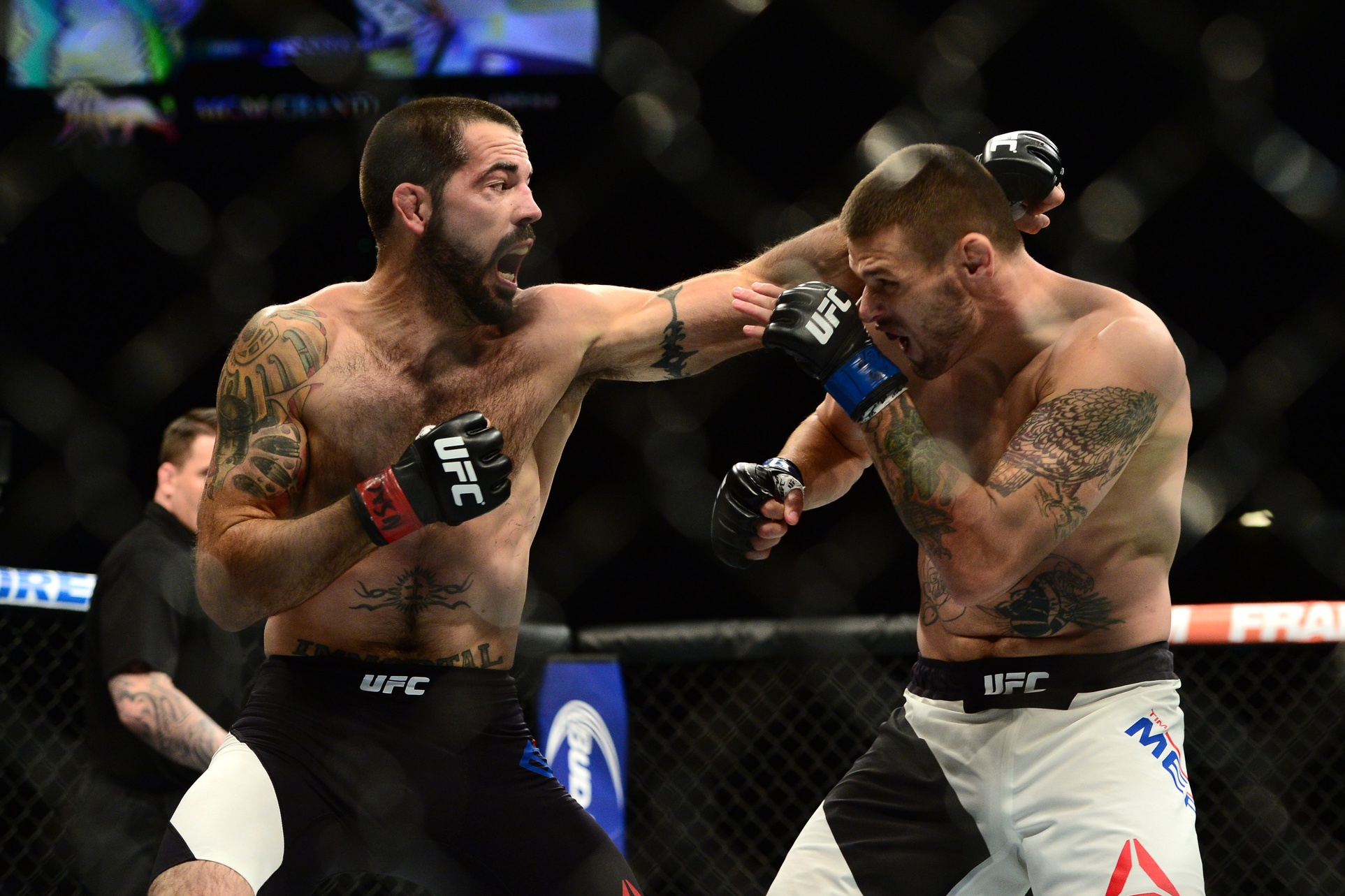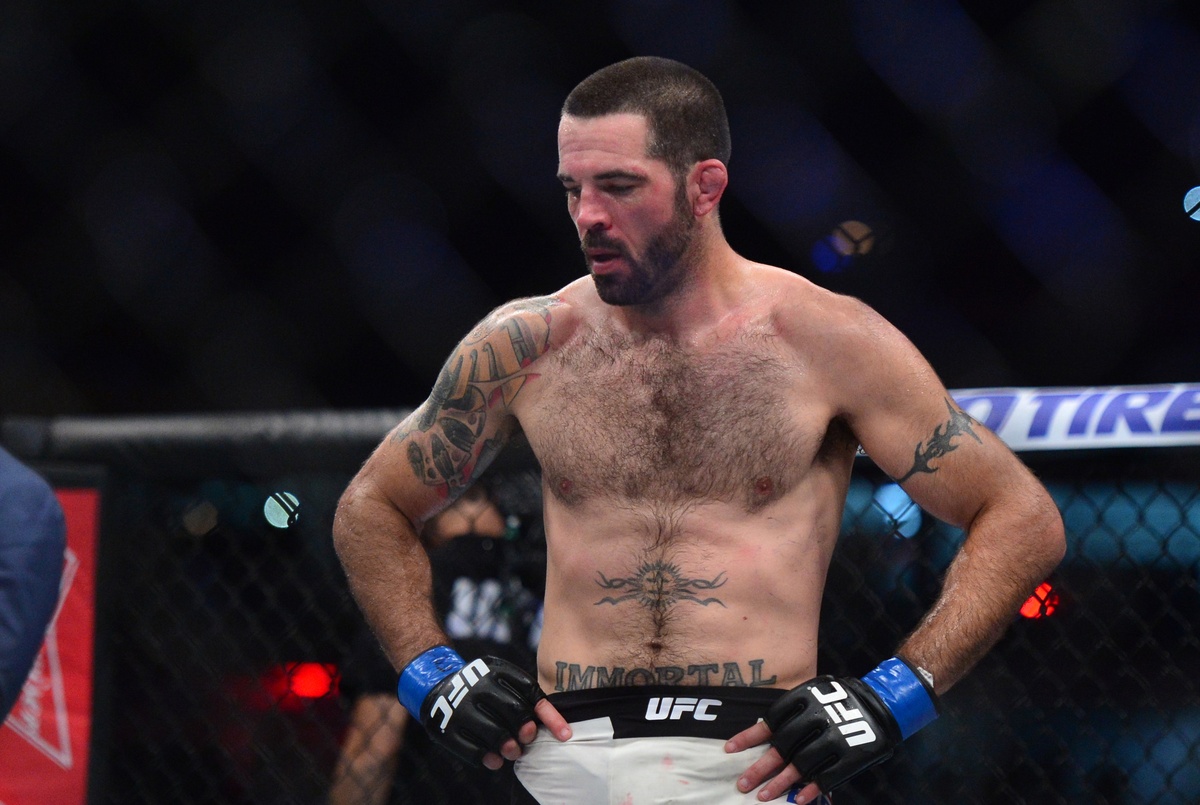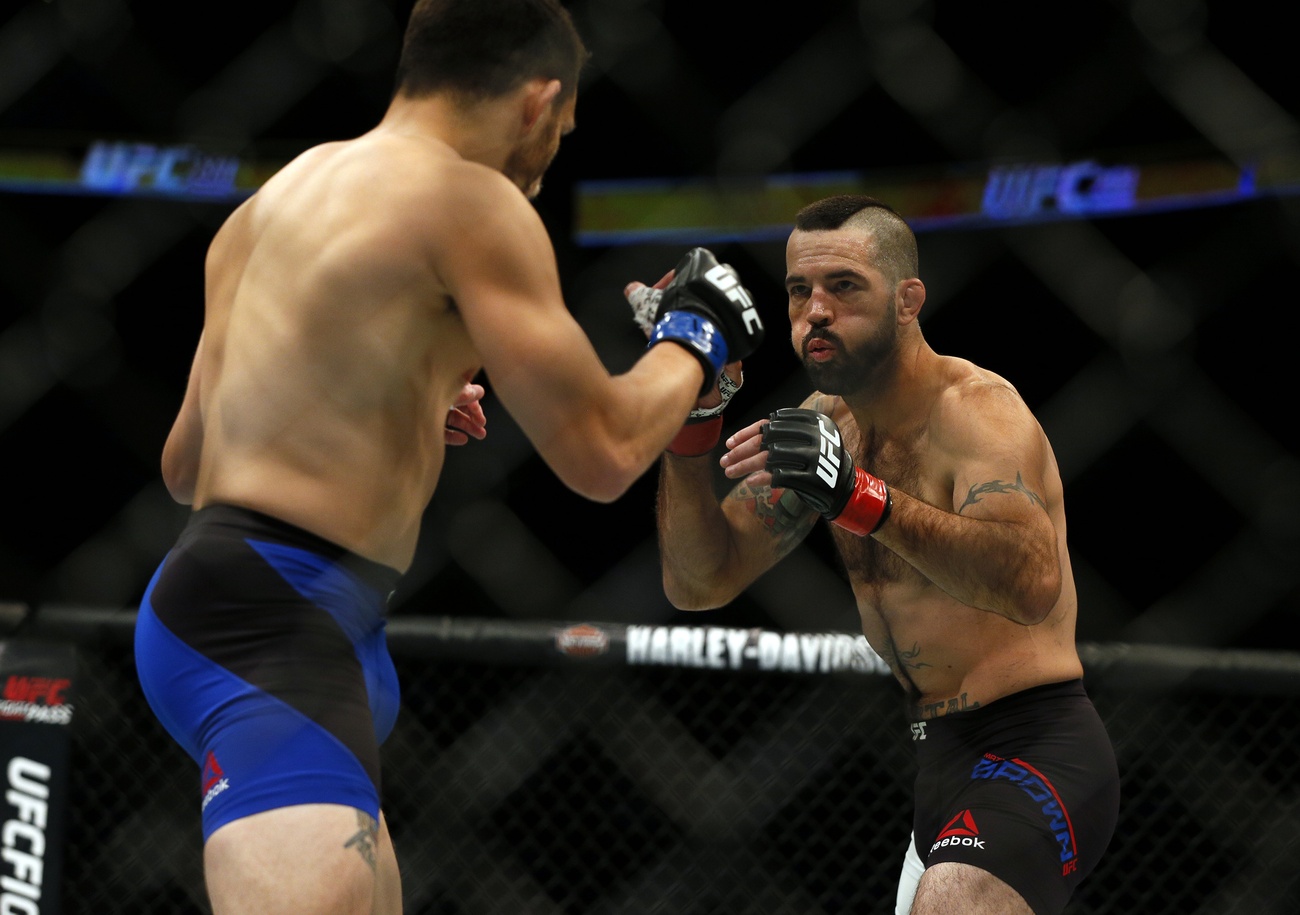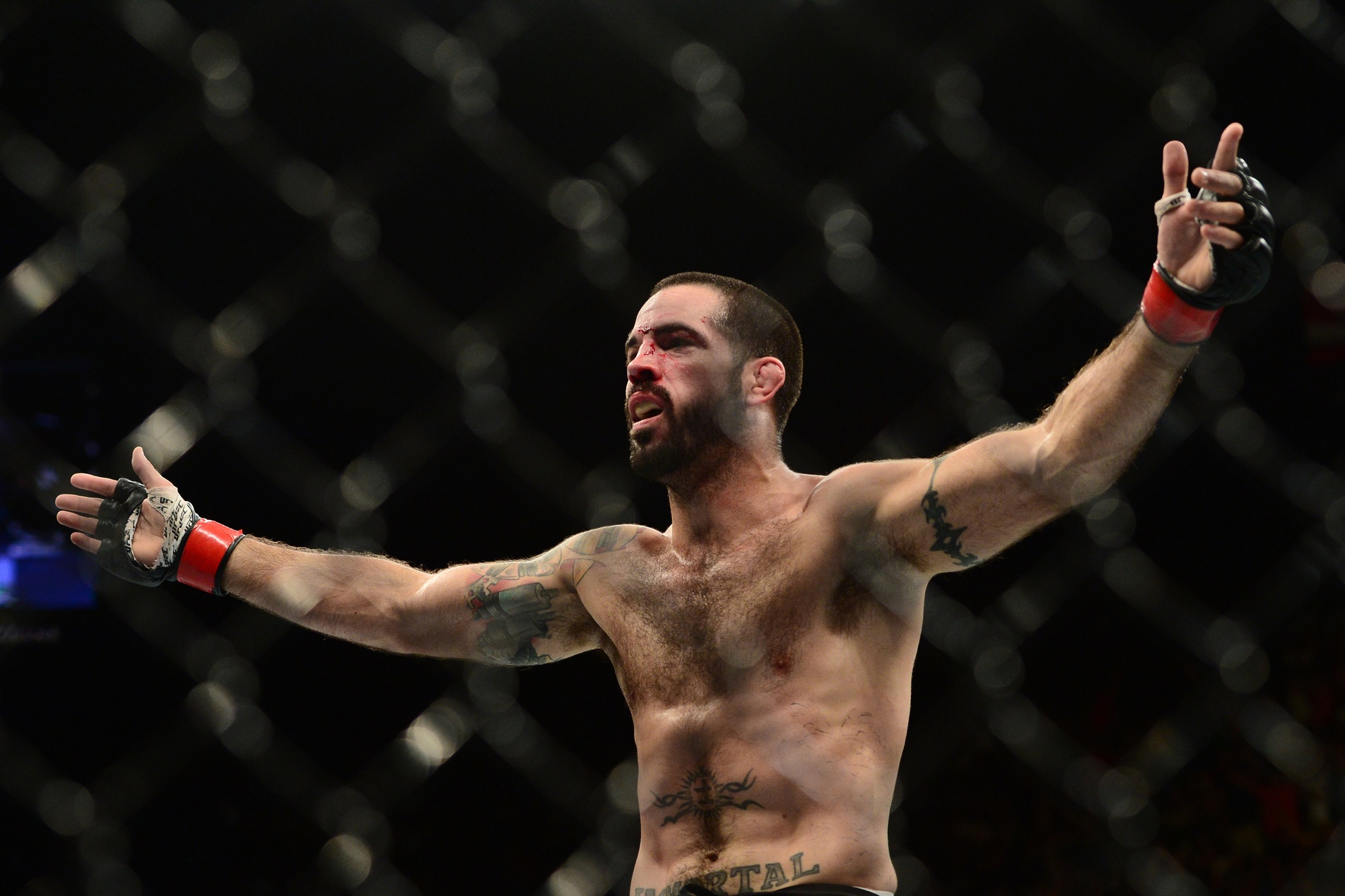Matt Brown: Weathering the Mean Season
Matt Brown: Weathering the Mean Season
UFC welterweight Matt Brown talks head injuries, fulfillment in fighting, past struggles, and more in this interview with Duane Finley.

Charging headlong into conflict is something the majority of humans couldn't force themselves to do. For Matt Brown, it's always come naturally.
Long before the Ohio native was a top-ranked welterweight fighter under the UFC banner, fighting was a staple in his life. Whether in the literal or figurative sense, Brown's connection to the struggle has been a constant, and it's within that reality he's found his place.
Rather than shy away and seek shelter, Brown buckled down and began searching for the deeper meaning in it all. And while his professional career is something Brown keeps in the here and now while discarding the hyperbole, the greater journey and the insistence to push beyond thresholds is the driving force behind the man himself.
"Every fight to me is the first and the last," Brown said. "I don't consider what I've done or worry about the past. It's just like the song says, 'Yesterday don't mean sh**.' I'm not concerned with what has happened to me in the past. I'm looking at what is going to happen in the future and whatever fight I'm heading into. I'm going to give it everything I have, and I'll fight tooth and nail to get the goddamn end. Hopefully that's enough to make a victory.
"I don't allow myself to get caught up in what I've done in the past, because nothing kills success faster than success. When you're taking pride in something, that means you are feeling like you've accomplished something and that's not how I approach things."
Despite 13 wins inside the UFC Octagon--including a seven-fight winning streak--Brown refuses to grow complacent.
"For me, I don't really feel like I've done anything," he said. "A lot of people may look at that a lot of different ways and think I've done something special or this or that, but that's not how I see it at all."

Jul 11, 2015; Las Vegas, NV, USA; Matt Brown (red gloves) and Tim Means (blue gloves) fight during UFC 189 at MGM Grand Garden Arena. Brown won via first round submission. Mandatory Credit: Joe Camporeale-USA TODAY Sports
Battling his way out of being just another competitor on The Ultimate Fighter to becoming a major player in arguably the most competitive weight class under the UFC banner is quite the accomplishment, but Brown isn't one to look for accolades.
His measure of progress comes from within, and there's no harsher judge of self-worth and personal motivation than the man in the mirror.
"There is so much more I want to do and so much more in my mind I know I'm capable of," Brown said. "That's what I want to reach. I want to reach my max capability. I want to break through the thresholds that genetics and life have handed me. I want to rise above all of this and look back one day when I'm beyond the plateau and on the downhill and then be able to take pride in it.
"Maybe it's because I'm not intelligent enough or maybe it's because I dream so big, but the mind's possibilities are endless. That is a big part of the joy of fighting for me. When you walk out of a fight knowing you went to new places and somewhere in there your mind went blank and you hit that robot/zombie mode. Man, that's a really, really good feeling."
Just as relentless as Brown's style inside the Octagon is his pursuit of growth. The 35-year-old welterweight seeks knowledge every day his feet hit the floor, and he has zero issue putting in the hard work to find what he's looking for.
Yet, in a business as rigorous as the fight game, nothing comes easily, and the lessons learned require a hefty price to be paid.

May 14, 2016; Curitiba, Brazil; Matt Brown (blue) looks on after losing to Demian Maia (not pictured) during UFC Fight Night at Arena Atletico Paranaense. Mandatory Credit: Jason Silva-USA TODAY Sports
"Things change and you have to adapt to it," Brown said. "I can't just call up five guys up and say, 'Let's just f****** go all out today in sparring.' The training has to be calculated and have a purpose. It's just like anything else where you learn as you go along, but the unfortunate part about this game is learning those lessons come at a price. You can't just push delete and try again. The lessons that come in the fight game [are] you are the one who is getting deleted every time.
"That's the sad part of this whole thing. We need some guys, and maybe someday I'll be one, who can bring some higher-minded thinking and approach to the fighters. I have it out here in Denver with Team Elevation, but I really think it's something fighters at every level of the sport need. We have some great minds out here, and our team is improving every day, and that's what it's all about: optimizing and maximizing yourself. If you aren't growing you're dying in this sport, and we are constantly looking to be moving upward."
Brown is a man quick to his point, and if there is one thing he makes absolutely clear in a conversation about his place in the 170-pound fold, it's that accomplishments mean very little to him. As a student of the Tony Robbins "Achievement vs. Fulfillment" debate, Brown doggedly seeks the latter, holding nothing back when addressing why that quest is one he's taken to heart.
"I seem to always come back to this point when I do interviews, but Tony Robbins hit the nail on the f***** head," Brown said. "Anyone out there who hasn't listened to it needs to, because it's an amazing little piece where he brings some incredible perspective. My purpose isn't [based] on achievement or these short-sided goals in this sport. I'm focused on the fulfillment aspect. With that in mind, I'm definitely looking to get something different out of this.
"I'm not looking to get rich. Of course that's a great byproduct of being in this sport, but that's not my motivation. You get into this for money, make that money, and then now what? You beat up some people for money and there's no fulfillment in that. Things go way deeper than that with me, and I don't ever look at things as just gain. This is a lifetime, lifestyle and a way of life for me. There's nothing I love more."
Brown takes this thought process a step farther, saying paycheck or not, he'd still strap on the gloves and throw down.
"I'd still be fighting if I weren't getting paid to do it professionally," he said. "It's what I love and it's always been that way. It's my life."

Jul 30, 2016; Atlanta, GA, USA; Matt Brown (red gloves) competes against Jake Ellenberger (blue gloves) during UFC 201 at Phillips Arena. Mandatory Credit: Butch Dill-USA TODAY Sports
Nevertheless, Brown is also a realist. He knows his current run--during which he's been finished in back-to-back outings--has left something to be desired, and he is determined to right the ship and return to his winning ways. The chips have been down before, plenty of times throughout his life in fact, and when faced with those conditions he's responded with ferocity.
And that is precisely his intention moving forward.
"I'm always looking to give my best, but there's absolutely something different that comes out of you when you are up against it," Brown said. "With that said, I've been fighting in some form or fashion my entire life, so nothing ever seems desperate to me. I'm always going to fight hard and I'm always going to push to be the man who comes out on the other side. Some people need that urgency to motivate them, but that's not how I see things."
No matter how determined Brown feels to set things back toward the positive, nothing internal or external will force him to ignore the signs his body gives him. Although a rough-and-tumble type whose penchant to throw caution to the win has made him a fighter to watch, Brown has taken notice of the wear and tear his body and mind have absorbed.
His most recent bout against Jake Ellenberger at UFC 201 back in July saw the resilient welterweight get dropped from a heavy right hand, which is something Brown had never experienced before inside the cage. In addition to taking the loss, the manner in which things played out has Brown taking the proper measures to ensure he's in the best condition possible to return.
"I'm taking things a little slow right now," Brown said. "I have some injuries I'm dealing with, and on top of that, some things about my last fight gave me cause for concern. In my fight against [Jake] Ellenberger it was the first time I had been dropped in my entire life by a headshot. I've been dropped by body shots, which don't really count, but never before by a shot to the head. I decided to take a little bit of extra time off and let my brain heal."
His career as a fighter is of the utmost importance to him, but thinking about his future with his wife and sons trumps all in Brown's world. He knows the price a fighter agrees to pay by taking up such a rugged trade, but that doesn't stop him from doing all he can to protect his quality of life after fighting comes to an end.

Jul 11, 2015; Las Vegas, NV, USA; Matt Brown (red gloves) reacts after submitting Tim Means (not pictured) during UFC 189 at MGM Grand Garden Arena. Brown won via first round submission. Mandatory Credit: Joe Camporeale-USA TODAY Sports
"I had a concussion in 2015, and I know what that is like and never want to go through that again," Brown said. "It was horrible, and I learned this lesson the hard way. The first concussion was f****** miserable. I was talking to my kids and forgetting sentences. I would get dizzy a lot and one time got up to use the restroom in the middle of the night and fell down. That was the final straw, and my wife made me go see a doctor.
"The worst part was talking to my kids and right in the middle of a sentence forgetting what I was saying to them. That's one of those things that was a rude awakening. I've been in this sport for a long time and I've been very fortunate to not have any real brain trauma. I've been fortunate, especially with my fighting style and the types of fights I've been in.
"I need to make sure my brain is 100 percent before I make my next move," he added. "I want to make sure everything is functional and healthy in order to minimize the long term damage. I want to be able to talk to my kids when I'm 50. I'm going to take it easy and make sure I'm good to go. I'm not going to end up in rough shape if I can prevent it. I know what I signed up for and what could happen, but if there is anything I can do to prevent it I'm going to do it."
Long before the Ohio native was a top-ranked welterweight fighter under the UFC banner, fighting was a staple in his life. Whether in the literal or figurative sense, Brown's connection to the struggle has been a constant, and it's within that reality he's found his place.
Rather than shy away and seek shelter, Brown buckled down and began searching for the deeper meaning in it all. And while his professional career is something Brown keeps in the here and now while discarding the hyperbole, the greater journey and the insistence to push beyond thresholds is the driving force behind the man himself.
"Every fight to me is the first and the last," Brown said. "I don't consider what I've done or worry about the past. It's just like the song says, 'Yesterday don't mean sh**.' I'm not concerned with what has happened to me in the past. I'm looking at what is going to happen in the future and whatever fight I'm heading into. I'm going to give it everything I have, and I'll fight tooth and nail to get the goddamn end. Hopefully that's enough to make a victory.
"I don't allow myself to get caught up in what I've done in the past, because nothing kills success faster than success. When you're taking pride in something, that means you are feeling like you've accomplished something and that's not how I approach things."
Despite 13 wins inside the UFC Octagon--including a seven-fight winning streak--Brown refuses to grow complacent.
"For me, I don't really feel like I've done anything," he said. "A lot of people may look at that a lot of different ways and think I've done something special or this or that, but that's not how I see it at all."

Jul 11, 2015; Las Vegas, NV, USA; Matt Brown (red gloves) and Tim Means (blue gloves) fight during UFC 189 at MGM Grand Garden Arena. Brown won via first round submission. Mandatory Credit: Joe Camporeale-USA TODAY Sports
Battling his way out of being just another competitor on The Ultimate Fighter to becoming a major player in arguably the most competitive weight class under the UFC banner is quite the accomplishment, but Brown isn't one to look for accolades.
His measure of progress comes from within, and there's no harsher judge of self-worth and personal motivation than the man in the mirror.
"There is so much more I want to do and so much more in my mind I know I'm capable of," Brown said. "That's what I want to reach. I want to reach my max capability. I want to break through the thresholds that genetics and life have handed me. I want to rise above all of this and look back one day when I'm beyond the plateau and on the downhill and then be able to take pride in it.
"Maybe it's because I'm not intelligent enough or maybe it's because I dream so big, but the mind's possibilities are endless. That is a big part of the joy of fighting for me. When you walk out of a fight knowing you went to new places and somewhere in there your mind went blank and you hit that robot/zombie mode. Man, that's a really, really good feeling."
Just as relentless as Brown's style inside the Octagon is his pursuit of growth. The 35-year-old welterweight seeks knowledge every day his feet hit the floor, and he has zero issue putting in the hard work to find what he's looking for.
Yet, in a business as rigorous as the fight game, nothing comes easily, and the lessons learned require a hefty price to be paid.

May 14, 2016; Curitiba, Brazil; Matt Brown (blue) looks on after losing to Demian Maia (not pictured) during UFC Fight Night at Arena Atletico Paranaense. Mandatory Credit: Jason Silva-USA TODAY Sports
"Things change and you have to adapt to it," Brown said. "I can't just call up five guys up and say, 'Let's just f****** go all out today in sparring.' The training has to be calculated and have a purpose. It's just like anything else where you learn as you go along, but the unfortunate part about this game is learning those lessons come at a price. You can't just push delete and try again. The lessons that come in the fight game [are] you are the one who is getting deleted every time.
"That's the sad part of this whole thing. We need some guys, and maybe someday I'll be one, who can bring some higher-minded thinking and approach to the fighters. I have it out here in Denver with Team Elevation, but I really think it's something fighters at every level of the sport need. We have some great minds out here, and our team is improving every day, and that's what it's all about: optimizing and maximizing yourself. If you aren't growing you're dying in this sport, and we are constantly looking to be moving upward."
Brown is a man quick to his point, and if there is one thing he makes absolutely clear in a conversation about his place in the 170-pound fold, it's that accomplishments mean very little to him. As a student of the Tony Robbins "Achievement vs. Fulfillment" debate, Brown doggedly seeks the latter, holding nothing back when addressing why that quest is one he's taken to heart.
"I seem to always come back to this point when I do interviews, but Tony Robbins hit the nail on the f***** head," Brown said. "Anyone out there who hasn't listened to it needs to, because it's an amazing little piece where he brings some incredible perspective. My purpose isn't [based] on achievement or these short-sided goals in this sport. I'm focused on the fulfillment aspect. With that in mind, I'm definitely looking to get something different out of this.
"I'm not looking to get rich. Of course that's a great byproduct of being in this sport, but that's not my motivation. You get into this for money, make that money, and then now what? You beat up some people for money and there's no fulfillment in that. Things go way deeper than that with me, and I don't ever look at things as just gain. This is a lifetime, lifestyle and a way of life for me. There's nothing I love more."
Brown takes this thought process a step farther, saying paycheck or not, he'd still strap on the gloves and throw down.
"I'd still be fighting if I weren't getting paid to do it professionally," he said. "It's what I love and it's always been that way. It's my life."

Jul 30, 2016; Atlanta, GA, USA; Matt Brown (red gloves) competes against Jake Ellenberger (blue gloves) during UFC 201 at Phillips Arena. Mandatory Credit: Butch Dill-USA TODAY Sports
Nevertheless, Brown is also a realist. He knows his current run--during which he's been finished in back-to-back outings--has left something to be desired, and he is determined to right the ship and return to his winning ways. The chips have been down before, plenty of times throughout his life in fact, and when faced with those conditions he's responded with ferocity.
And that is precisely his intention moving forward.
"I'm always looking to give my best, but there's absolutely something different that comes out of you when you are up against it," Brown said. "With that said, I've been fighting in some form or fashion my entire life, so nothing ever seems desperate to me. I'm always going to fight hard and I'm always going to push to be the man who comes out on the other side. Some people need that urgency to motivate them, but that's not how I see things."
No matter how determined Brown feels to set things back toward the positive, nothing internal or external will force him to ignore the signs his body gives him. Although a rough-and-tumble type whose penchant to throw caution to the win has made him a fighter to watch, Brown has taken notice of the wear and tear his body and mind have absorbed.
His most recent bout against Jake Ellenberger at UFC 201 back in July saw the resilient welterweight get dropped from a heavy right hand, which is something Brown had never experienced before inside the cage. In addition to taking the loss, the manner in which things played out has Brown taking the proper measures to ensure he's in the best condition possible to return.
"I'm taking things a little slow right now," Brown said. "I have some injuries I'm dealing with, and on top of that, some things about my last fight gave me cause for concern. In my fight against [Jake] Ellenberger it was the first time I had been dropped in my entire life by a headshot. I've been dropped by body shots, which don't really count, but never before by a shot to the head. I decided to take a little bit of extra time off and let my brain heal."
His career as a fighter is of the utmost importance to him, but thinking about his future with his wife and sons trumps all in Brown's world. He knows the price a fighter agrees to pay by taking up such a rugged trade, but that doesn't stop him from doing all he can to protect his quality of life after fighting comes to an end.

Jul 11, 2015; Las Vegas, NV, USA; Matt Brown (red gloves) reacts after submitting Tim Means (not pictured) during UFC 189 at MGM Grand Garden Arena. Brown won via first round submission. Mandatory Credit: Joe Camporeale-USA TODAY Sports
"I had a concussion in 2015, and I know what that is like and never want to go through that again," Brown said. "It was horrible, and I learned this lesson the hard way. The first concussion was f****** miserable. I was talking to my kids and forgetting sentences. I would get dizzy a lot and one time got up to use the restroom in the middle of the night and fell down. That was the final straw, and my wife made me go see a doctor.
"The worst part was talking to my kids and right in the middle of a sentence forgetting what I was saying to them. That's one of those things that was a rude awakening. I've been in this sport for a long time and I've been very fortunate to not have any real brain trauma. I've been fortunate, especially with my fighting style and the types of fights I've been in.
"I need to make sure my brain is 100 percent before I make my next move," he added. "I want to make sure everything is functional and healthy in order to minimize the long term damage. I want to be able to talk to my kids when I'm 50. I'm going to take it easy and make sure I'm good to go. I'm not going to end up in rough shape if I can prevent it. I know what I signed up for and what could happen, but if there is anything I can do to prevent it I'm going to do it."